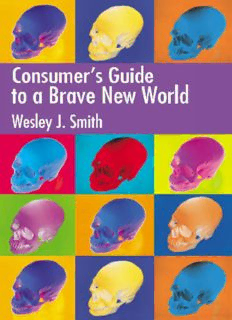
Consumer's Guide to a Brave New World PDF
Preview Consumer's Guide to a Brave New World
Consumer’s Guide to a Brave New World Wesley J. Smith Encounter Books SAN FRANCISCO Copyright © 2004 by Wesley J. Smith All rights reserved, Encounter Books, 665 Third Street, Suite 330, San Francisco, California 94107-1951. First edition published in 2004 by Encounter Books, an activity of Encounter for Culture and Education, Inc., a nonprofit, tax exempt corporation. Encounter Books website address: www.encounterbooks.com Library of Congress Cataloging-in-Publication Data Smith, Wesley J. Consumer’s guide to a brave new world / by Wesley J. Smith p. cm. ISBN 1-594030-92-8 1. Biotechnology—Social aspects. 2. Genetic engineering—Social aspects. I. Title. TP248.23 .S657 2004 306.4'61—dc22 2004056273 10 9 8 7 6 5 4 3 2 1 To Mark Pickup— “Blessed are the pure in heart for they shall see God.” Contents ■ ■ ■ ■ ■ ■ ■ ■ ■ ■ ■ ■ ■ ■ ■ ■ ■ ■ ■ ■ ■ ■ ■ ■ ■ ■ ■ ■ ■ ■ ■ ■ ■ ■ ■ ■ ■ ■ ■ ■ ■ ■ ■ ■ ■ ■ ■ ■ ■ ■ ■ ■ ■ ■ ■ ■ ■ Introduction ix Chapter 1 Biotech New World 1 Chapter 2 The Great Stem Cell Debate of 2001 19 Chapter 3 Reproduction as Replication 49 Chapter 4 The Foot in the Door to Brave New World 69 Chapter 5 Political Science 93 Chapter 6 Will Humans Remain Human? 127 Chapter 7 Food for Thought 157 Glossary 175 Acknowledgments 179 Notes 181 Index 209 vii Introduction ■ ■ ■ ■ ■ ■ ■ ■ ■ ■ ■ ■ ■ ■ ■ ■ ■ ■ ■ ■ ■ ■ ■ ■ ■ ■ ■ ■ ■ ■ ■ ■ ■ ■ ■ ■ ■ ■ ■ ■ ■ ■ ■ ■ ■ ■ ■ ■ ■ ■ ■ ■ ■ ■ ■ ■ ■ THISBOOKISABOUTTHEHUMANFUTURE.More precisely, it is about the power of biotechnology to affect the human future by har- nessing our bodies at the cellular level, first to employ them as raw material in the manufacture of medicines, and ultimately to transform what we commonly regard as human nature. In these pages we will explore the scientific, moral and business aspects of cloning, embryonic and adult stem cell research and genetic engineering; we will consider the potential for miracle medical cures and the prospect of fab- ricating “designer babies”; and we will ponder the tremendous impact these activities are bound to have on us all. Few contemporary issues are as important, or as controversial. The decisions we make today about biotechnology will materially impact each of our lives and those of our children; this potent new science will transform society, and conceivably even what it means to be human. For better and for worse—perhaps very much worse—biotechnology is devel- oping the godlike power not only to improve our health and extend our longevity, but also to remake the biology of the human species. Issues that were once the exclusive domain of science fiction writ- ers are now everyday headlines: In early 2003, the Raelians, a science cult fixated on flying saucers, made international headlines by claiming it had created the first cloned human babies;1biotech companies’ press releases boast about developing medical products manufactured from tissues derived from the destruction of nascent human life;2and with the successful mapping of the human genome, some bioethicists and futurists now urge that we use the information we have gained to ix x Consumer’s Guide to a Brave New World manufacture offspring enhanced for greater intelligence, strength and beauty. No wonder some observers fear—while others eagerly antici- pate—that genetic engineering will steer us toward the creation of a “posthuman” race.3 Experiments involving the very building blocks of life are already being conducted. A biotech company has patented a herd of goats genet- ically engineered to include spider DNA, so the herd’s ewes produce milk containing spider-web silk; the feat has been repeated with cows and hamsters.4Cloning researchers claimed to have produced an early embryo that was mostly human, but also part animal.5A mouse exists today with millions of human cells in its brain.6Some biotechnologists and bioethicists look forward to the time when similar research will be conducted on human beings. But such surreal experimentation is far from being the whole story. Biotechnology holds extraordinary promise for alleviating human suf- fering in a greatly improved and fully human future. Scientists are learn- ing how to treat illnesses utilizing the patients’ own cells as healing medicines: in early human trials, patients’ tissues have been put to work treating damaged hearts, Parkinson’s disease and multiple sclerosis.7 Still, many of these emerging technologies may have “dual use” potentials, leading many to worry that they will be harnessed in the serv- ice of malevolent purposes. Self-described “transhumanists” advocate that we seize control of human evolution by designing genetic enhance- ments to “improve” the human race. As an example of this sort of think- ing, the Nobel Prize-winning scientist James D. Watson, co-discoverer of the DNA double helix, has claimed that genetically enhanced people will someday “dominate the world.”8Are there echoes here of the long- discredited “master race” idea? With biotechnology offering so much good and threatening such harm, the question comes down to this: Does society have the capacity and the will to guide and regulate science so as to keep it on a path that not only improves our lives, but also proceeds with deep respect for the inherent dignity and intrinsic value of our humanity? Few contempo- rary issues are so consequential. As Leon Kass, chairman of the Presi- dent’s Council on Bioethics, said to me: All of the natural boundaries are up for grabs. All of the boundaries that have defined us as human beings, boundaries between a human being
Description: